Blogging and social media have introduced me to many wonderful people, including professional artists and aspiring artists. How to Dramatically Improve Your Art is a guest post by my good Facebook friend, Dougie Hoppes. Dougie loves to paint, he is a student of his craft and has made remarkable artistic improvements within the 5 years we have been conversing. Below are his tips on how to improve your art!
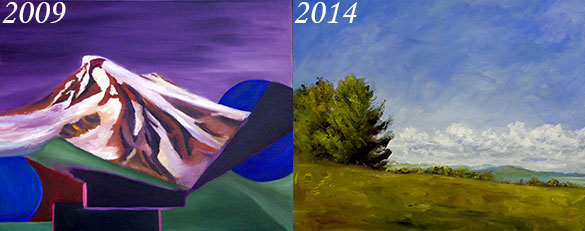
How To Dramatically Improve Your Art
20 hours a week. Painting in oils for 5 years. Not obsessively working all of the time. Not giving up family or friends and working until you can’t see. Not giving up your health to become a fantastic artist. 20 hours a week. Sounds like an infomercial, doesn’t it?
In my mind, how to improve your art is about consistency. It’s about spending time at the easel and actually painting. It’s about addressing your weak points and figuring how to fix them. It’s about taking the occasional workshop or lesson to help get you past any point that you are having issues with. It’s about getting real objective critiques that show you what you are doing right and what could be improved on.
Improving your painting skill is not about spending all of your time reading or watching tutorials. It’s not about surrounding yourself with people who admire everything that you do or surrounding yourself by people who hate everything that you do. It’s not about painting when you feel like it. It’s not about telling people that you are an artist.
It’s about the work. As you can see from the paintings above, there is a huge difference between the two paintings and they were done five years apart…. to the month. At the time that I did the first painting, I was proud of it. It was the best that I could do at that time. The newest painting is another one that I’m proud of. It’s the best that I can right now. Imagine where I’ll be in five more years?
So, how did I get from one state to another? Here’s some basic tips to improve your art:
I spent a lot of time at the easel.
Of all of the methods for improving my work, this, single-handedly, is the most important. How many times have you read something and thought that you understood it? How many times have you forgotten what you read or watched? How many times have you said that “I worked a lot this week” and, in reality, all you did was watch videos?In order for the lessons to stick, you have to spend time at the easel and apply that knowledge that you learned. You have to figure out what holes there are in that knowledge that the book or video didn’t show you. You have to physically do what you have learned.
I kept a monthly log of the paintings and sketches I produced.
One of my most important tricks is to create an image, each month, of all of my paintings and drawings that I created that month. I can see if I’m actually working in a particular month or not. I can see if I’m improving or just reinforcing bad habits.
I took workshops to help me resolve issues that I couldn’t figure out.
Sometimes, the books or videos don’t show you what you don’t know. So, taking a workshop here and there (I don’t recommend more than two a year and I would recommend trying to always go to the same instructor) will help fill in that knowledge. There’s nothing like having hands-on instruction to show you what you are missing and how to fix it.
I read books and watch tutorials on how to improve my techniques.
Yes… I also read books and watch videos. I just don’t confuse them with actual painting time. Most of the time, these are viewed at the end of the night and after I have spent time at the easel. They are valuable and there’s a lot of knowledge that you can get from them. Just don’t confuse this with actually working on your art.
Finding the time to paint.
After spending time with the wife and dogs and my full-time day job, I have about 4 hours of free-time a night, and 10 hours each day on the weekend. That’s a lot of time. However, I need to make sure that I make time for me to do things other than art work. So, doesn’t matter if I can’t draw tonight or tomorrow night. At the end of the week, I know that I should have about 20 hours in. If the week is too busy, at the end of the month, I know that I should have painted for about 80 hours. I want to be a full-time artist. I’m not in a hurry. This approach of consistently working and improving will help me get to my goals.
Guest author/artist: Doug Hoppes is a Vermont artist, who loves learning and painting the local landscapes. You can find him on Facebook too!
*****
Thank you again Dougie for another helpful guest post,. It has been exciting watching you grow as a painter. And…thank you for continued friendship and support on my FineArtTips Facebook page. ~Lori
*You can find more great tips on Fine Art Tips Facebook Fan Page, on Twitter, Google Plus and on Pinterest. Be sure and check out and my fine art prints and notecards on Fine Art America. Check out my website, LoriMcNee.com. ~Lori


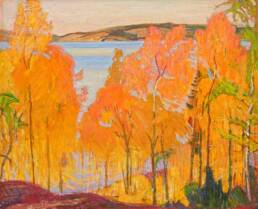
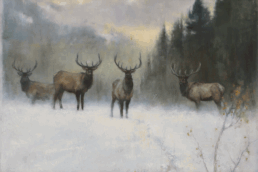
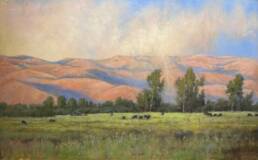
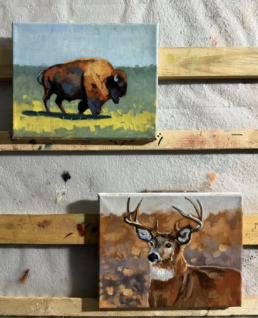
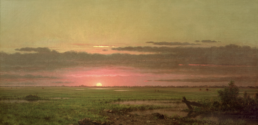
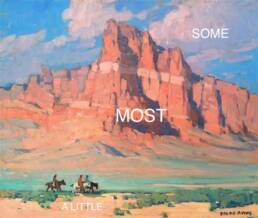
I loved Dougs post. It says all the things I think are important. You’ve got to paint to be an artist and most of it is done on your own.
Hi Mary, thanks for adding your thoughts to this post. It is so true. Each artist has to basically ‘just do it’… 🙂
It’s very inspiring, Doug! I’ve been painting for 2.5 years and I can see huge improvement in my own work, too. So to imagine where I’ll be in 25 years time always make me feel high!
Only recently have I begun to understand that inspiration to paint DOES NOT come from buying a new art book, brushes, paints, pastels, paper, canvas. Inspiration comes from actually having done something. Let’s translate this to computer programming. Creating a line of code that says “Hello World!” does not make you a programmer, nor is the result of executing that code anywhere near motivating enough to make you want to create more code. It simply means that you have taken the first step toward learning programming syntax (a language, if you will), and that you are working in an environment that is conducive to creating and executing code. Painting a simple box with your new brushes or on that new canvas, using that new art book, won’t make you an artist or want to create something greater. It just means your paint isn’t dried up, that the teacher so far hasn’t mislead you.
I love your addition to this comment thread!
Its nice to see these types of thread. I learned that painting and drawing does come from you, inside and makes you as an artist of your own soul. Thanks Lori McNee, loved your art works :D. God bless.
Hello Lira, my apologies for the very late reply. I am way behind and I do appreciate your comment. Thanks so much!!